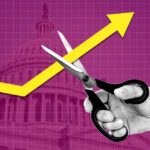A growing number of policymakers are debating whether to restructure or repeal the Consumer Financial Protection Bureau (CFPB), raising questions about the agency’s power and effectiveness. While supporters argue the CFPB protects consumers, critics say it has harmed those it was meant to help.
The Cato Institute takes a look at solutions for the CFPB in a new blog titled “Restructure or Repeal? What’s the Best Way to Fix the Consumer Financial Protection Bureau?”
In a letter to the Senate Banking Committee, Senate Democrats claimed efforts to defund the CFPB would make it “easier for bad actors to cheat American families.”
At a late June House Financial Services Committee hearing, defenders praised the Bureau’s work but failed to address testimony regarding agency overreach and overregulation.
According to another news outlet report, five years after the CFPB was created by the Dodd-Frank Act, the number of banks offering free checking accounts had been cut by a dramatic 50%. Additionally, it is reported that some smaller banks had stopped funding mortgages altogether, and making matters even worse, low-income consumers in particular are struggling more to procure car loans and credit cards.
Critics argue that the CFPB’s structure gives too much power to a single director. Chief Justice John Roberts called the CFPB director someone who possesses “vast rulemaking, enforcement, and adjudicatory authority over a significant portion of the U.S. economy.” Although the Supreme Court ruled the president must be able to remove the director, critics say that check is rarely used.
The agency’s funding also bypasses Congress. Rather than rely on appropriations, the CFPB is funded by Federal Reserve earnings. Though the Supreme Court upheld this arrangement, it is clear and undeniable that such an arrangement poses concerns and challenges regarding congressional oversight.
Some lawmakers propose reducing the CFPB’s funding. The Senate’s version of the One Big Beautiful Bill Act (OBBA) would cut the CFPB budget cap from 12% to 6.5% of Fed earnings. The House version would lower it to 5%. Others back the Defund the CFPB Act, which would eliminate the budget altogether.
But critics argue that only full repeal of the agency will force needed change. H.R.1603, the Repeal CFPB Act, would grant back the current enforcement functions to the agencies that handled them before the CFPB was created back in 2010. Many believe this is the only way forward, and that only through absolute elimination of the CFPB will policymakers then be forced to reconsider the flaws in the foundation of the original inception of a special regulator for consumer finance.
Click here for more on the Cato Institute’s analysis of the CFPB.






